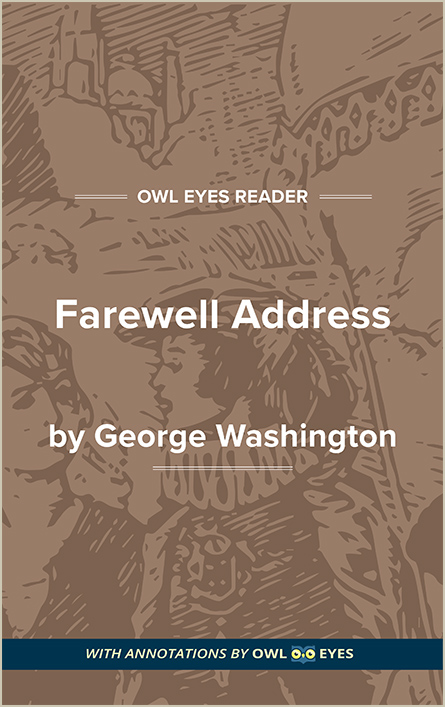Analysis Pages
Historical Context in Farewell Address
George Washington’s Presidency: George Washington was the first President of the United States, serving two terms from 1789 to 1797. For each of his terms, he was voted into office unanimously, a feat unrepeated since. Also unique was his unwillingness to bend to party politics, a topic he discussed at length in his “Farewell Address.” He never joined a party, preferring to serve as an independent. During his time in office, he set many important precedents, including the placement of the federal capital on the banks of the Potomac River—what would become Washington, D.C.—as well as the establishment of a cabinet of presidential advisers. Important legislation of his presidency included laws that expanded naturalization rights and copyrights, the Fugitive Slave Act, and the Slave Trade Act.
The French Revolution: The French Revolution took place between 1789 and 1799, thus encompassing George Washington’s presidency. The revolution was one of the most prominent and controversial political affairs of the era, stratifying the opinion of Americans. While many wished to aid the French insurgents who, like the American founders themselves, wished to establish a democracy in the place and wake of the monarchical reign of Louis XVI, others resisted such “foreign entanglement,” including President Washington. In his “Farewell Address,” Washington devotes a good deal of effort to advancing the policy of isolationism: remaining uninvolved in the affairs of other nations.
Bipartisan Politics: George Washington noticed the rise of party politics during his time as a general and president; he did not favor this trend, which he called “sectionalism.” In the early years of the nation, the two factions were the Federalists and the Anti-Federalists (later the Democratic Republicans), the former favoring a powerful centralized government, the latter favoring a small-scale, federal government that largely defers to states and individuals. These two strains, the former more liberal, the latter more conservative, have remained the predominant pair of forces in American bipartisan politics ever since, though the guises and names have often changed.
Historical Context Examples in Farewell Address:
Text of Washington's Address
🔒"the faults of incompetent abilities will be consigned to oblivion, as myself must soon be to the mansions of rest...." See in text (Text of Washington's Address)
"Belligerent Powers..." See in text (Text of Washington's Address)
"a neutral position...." See in text (Text of Washington's Address)
"In relation to the still subsisting war in Europe, my Proclamation of the 22d of April 1793, is the index to my Plan...." See in text (Text of Washington's Address)
"honesty is always the best policy...." See in text (Text of Washington's Address)
"Religion and Morality are indispensable supports...." See in text (Text of Washington's Address)
"those overgrown military establishments..." See in text (Text of Washington's Address)
"The North, in an unrestrained intercourse with the South..." See in text (Text of Washington's Address)
"external as well as internal..." See in text (Text of Washington's Address)
"unanimous advice of persons entitled to my confidence impelled me to abandon the idea...." See in text (Text of Washington's Address)
"had even led to the preparation of an address to declare it to you..." See in text (Text of Washington's Address)
"Philadelphia Daily American Advertiser..." See in text (Text of Washington's Address)
"1796..." See in text (Text of Washington's Address)
"to the permanency of your felicity as a people..." See in text (Text of Washington's Address)

